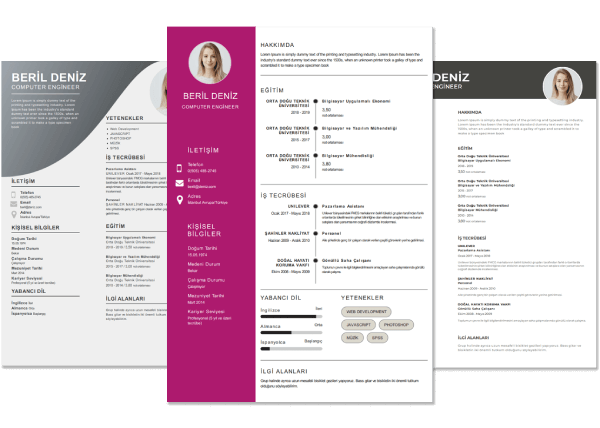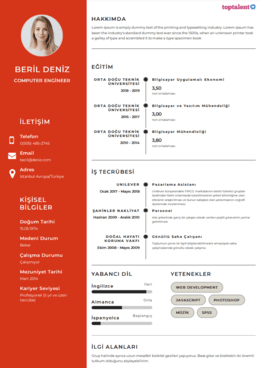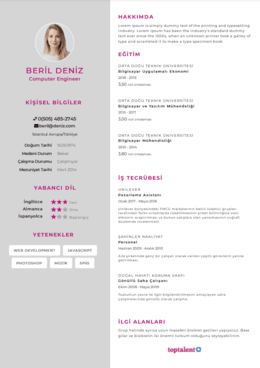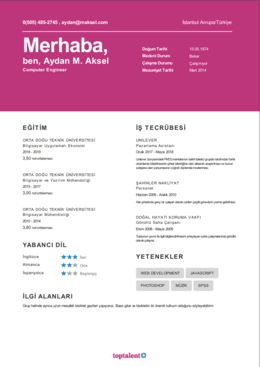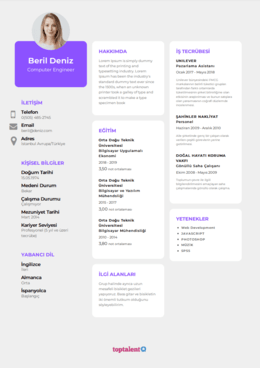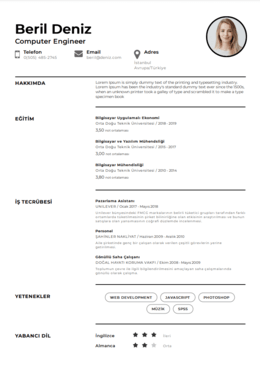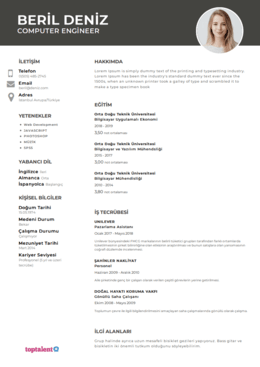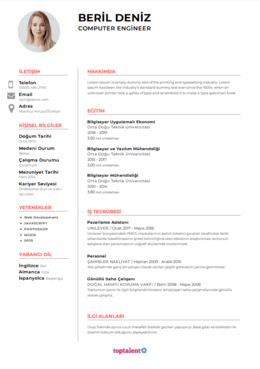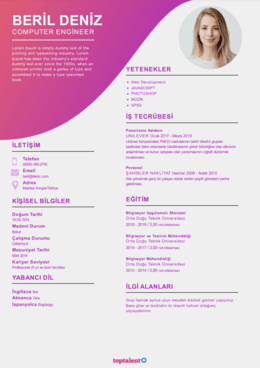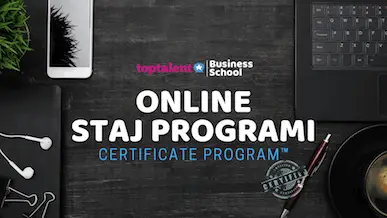Resume Help Pelin Özbilgin
How to List Education on a Resume: Section Examples & Tips
Yeni CV örneklerini inceleMost people find it as simple as Tic Tac Toe to list their education on a CV. University name, degree, and year of graduation completed. But for some people, it's more difficult than it seems to figure out how to list your schooling on a CV.
For instance, should education or experience appear first on a resume? And if you're still in college, how do you put your education on a resume?
In every situation, this article will show you how to list your education on a resume:
even if you didn't finish high school, how to list your high school education on a resume.
How to list education on a resume whether you have graduated from college, are still a student, or have never attended one.
How to list your education professionally on a resume.
Where to put the education part on a resume and what to include.
How to List Education on a Resume
Let's begin with the fundamentals.
What To Put in The Education Section of Your Resume
A recent degree of yours (or education in progress)
Your institution's name
Where your school is located
Dates of attendance and graduation (or expected graduation date)
Your primary academic focus and degree major
Your GPA (only if it is greater than 3.5)
Any academic distinctions, pertinent courses, or dean's list placement
Extracurriculars that are pertinent, study abroad opportunities, and awards
The education section of your resume is typically the simplest to write.
The following advice:
Start with the degree you hold the highest.
In reverse chronological order, add all additional degrees.
Do not provide your high school information if you have completed college.
A resume's GPA is not required to be included. If you graduated within the last three years and your GPA was more than 3.0, you should only include it. If not, lose it. The majority of recruiting supervisors don't give a damn about GPAs.
Here's an illustration:
Education
English literature MA from 2009
Cambridge, Massachusetts' Harvard University
3.7 GPA
English literature BA from 2007
Philadelphia University of Pennsylvania
4.0 GPA
Pretty basic, yes?
Here are four additional suggestions to make things even simpler:
Master of Arts can be used as your degree's full name or just the letters "MA."
Periods can be used to separate the initials "M.A." or they can be omitted.
You can either write out the name of your major, such as "MA in Psychology," or you can just write "MA, Psychology," separating your degree from your major.
You can order the information in many ways.
The candidate above, for instance, is a Harvard graduate.
She might believe that her degree in literature doesn't immediately correspond to the position she's looking for. Being an English major, that is possible.
In that instance, she could wish to start by mentioning that she went to Harvard:
Cambridge, Massachusetts' Harvard University
English Literature MA
2009 graduate with a 3.7 GPA
Just be sure to maintain consistency in the formatting of the information in your schooling section.
For the majority of you, listing your education on a resume is a simple process. You can include more details if you'd like.
Anyone with some professional experience can benefit from the material above.
Read on; we've got you covered if you just graduated or haven't finished your degree. Keep reading.
Where Should Education Go on a Resume?
If you are a student or recent graduate with little work experience, you can prioritize your education over your employment history. Your schooling should follow after your working history if you have more than a year of professional experience. Go through your most recent degree first. Mention your GPA if it is 3.5 or higher. Keep in mind the importance of appropriate coursework, honors, and dean's list placement.
As the experience area is more pertinent and significant to recruiters, resumes typically begin with it. However, if your education is far superior to your experience, it is OK to deviate from this norm.
Put your professional work history part before your educational history if you are an experienced professional.
At this stage of your career, hiring supervisors will find your work experience to be much more significant.
Pro Tip: Look at our guidelines and examples of resumes here if you want to save time and learn how to write an excellent resume for your profession.
How to Add Your High School Education to a Resume
Make an entry like this if high school is your greatest level of education:
In Cherryville, Ohio, Cherryville High School
2005 graduate
You only need to do that. I'm not making this up.
When deciding what else to put on a student resume, focus on things that highlight your abilities and accomplishments.
This might include any work you did while in high school as well as accolades, awards, and extracurricular activities.
Your resume should be customized for the position. Therefore, choose activities that will demonstrate the important concepts presented there.
You might also want to list your schooling, highlighting any courses that relate to the duties of your new position.
What if, though, you weren't a high school graduate?
Here is an illustration of how to write:
In Cherryville, Ohio, Cherryville High School
Attended college between 2003 and 2005.
Just include your school's name and the years you attended.
If you are still a high school student, format it as follows:
In Cherryville, Ohio, Cherryville High School
Expected 2009 graduation
If you didn't finish high school but later earned a GED, format it as follows:
High school diploma equivalent GED
2009, Ohio's Cherryville Adult Learning Center
In Cherryville, Ohio, Cherryville High School
From 2003 to 2005, I went to school.
Say you graduated from high school and went on to earn a license or certificate that you want to list on your resume since it is pertinent to the position you are going for.
Your license or certificate should come before the information about your high school.
2009 Cosmetology License
In Cherryville, Ohio, there is a beauty school.
In Cherryville, Ohio, Cherryville High School
2005 graduate
Yes, You Can Put Unfinished Higher Education on Your Resume
Consider a scenario in which you attended college but later decided that $30,000 in annual student debt wasn't for you.
That doesn't mean you can't use the work you already completed.
Unfinished college coursework is still acceptable to list on a resume. You simply need to enter the credits you were able to obtain.
Following, list your high school coursework as follows:
Columbus, Ohio's Ohio State University
2005 -2007 60 credits remaining for a BS in Psychology
In Cherryville, Ohio, Cherryville High School
2005 Graduate
It is yours if you paid for it. You can include the curriculum on your resume if it is pertinent.
We now come to higher education that is still being developed. midway through earning a degree?
Easy.
Write it like this on your resume:
English Literature BA student in progress
Bronxville, New York's Sarah Lawrence College
The following list of words might be used to indicate that a degree is still being earned:
taking place
expected + date
Date + anticipated
Date plus anticipated graduation
Date to be completed plus
Here’s How to Put Your Higher Education on Your Resume
If you have a university degree, as was previously said, you should list it first.
What else would you expect a section on education to contain, though?
Say you have little to no prior employment experience.
In that situation, it wouldn't be a bad idea to add a few bonus points.
If you have a university degree, as was previously said, you should list it first.
What else would you expect a section on education to contain, though?
Say you have little to no prior employment experience.
In that situation, it wouldn't be a bad idea to add a few bonus points.
Honors and Awards
Relevant Academic Work
Additional Academic Activities
Publications
Put Latin honors next to your degree in the education part of your resume if you completed an honors program, received the highest honors (magna cum laude or summa cum laude), or were your class' valedictorian or salutatorian.
Example:
Biology major with honors, valedictorian, and Magna Cum Laude
West Lafayette, Indiana's Purdue University
a 2012 graduate
Other accolades and prizes can include:
any scholarship or academic award.
Academic distinctions other than enrollment in an honors program, such as being named to the Dean's List or being admitted to honors societies (campus, national, or international).
Note that if you believe you have too many awards to list or wish to bring particular emphasis to them, you can create a separate Honors and Awards section.
The same is true for PhD students' academic publications.
If you have a lot of publications to show on your non-academic CV, you can either add a distinct section or list them all under your degree.
Do keep in mind that a student resume shouldn't be more than one page long and should be concise.
Adding sections (such as Hobbies and Interests) can be excellent if you're having trouble filling up space. However, don't include so much extra material that your resume fills up the entire second page.
A description of the coursework is another good addition to a student resume. Make sure the courses you select are appropriate for the position for which you are applying.
A coursework summary can demonstrate that you have the knowledge and skills necessary for the position even if you have little to no prior work experience.
Additionally, you can demonstrate that you completed classes pertinent to your professional sector if you have a degree in a different subject. For instance, you might be looking for a marketing position despite having a psychology degree.
Have you taken any classes in communication or business? These are appropriate to include in the description of your course work.
Example:
Psychology Bachelor of Arts
Berkeley, California's University of California
Relevant Coursework: English Language Studies, Social Psychology, Business Communication, Grammar and Editing
It's also acceptable if you want to elaborate on this further. You may describe a broad course of study that equipped you with a certain skill set you want employers to take notice of.
If you recently graduated and need to bolster your CV, you can also highlight your extracurricular activities.
Just don't contribute anything contentious (political or religious).
Employers prefer the following abilities on student resumes:
Leadership
Teamwork abilities
Talents in communication
Abilities to solve issues
You can include it in your education section if you engaged in any activities that would demonstrate these abilities (or if you enrolled in a study abroad program).
Example:
Psychology Bachelor of Arts
Berkeley, California's University of California
Relevant Coursework: English Language Studies, Social Psychology, Business Communication, Grammar and Editing
Captain of the lacrosse team(extracurricular activities)
Additionally, a strong cover letter that complements your CV will set you apart from other applicants. You can create one using this cover letter builder. Here's what it might resemble:
Key Takeaway
The important thing to keep in mind is that there aren't any strict guidelines for adding schooling to your CV.
The education component might come either before or after the experience section.
You can include as little or as much information as you require.
Until you have enough professional experience, your education department can handle the heavy lifting for pupils.
The courses you did complete can be listed on your resume even if you didn't obtain a degree.
In the end, you should view the schooling component of your application as a chance to put yourself slightly above the competition.
Frequently Asked Questions about the Resume Education Section
How should I list my education on a resume?
If you have a few years of relevant job experience, only indicate your greatest level of education, along with the subject you studied, the institution's name, and the year you graduated. However, it's advisable to include additional information that highlights your important skills if you're drafting a resume without any prior work experience, such as:
Scholarly projects and coursework that is pertinent
Academic successes, such as being named to the Dean's list, obtaining an incredibly high GPA, or receiving an honors degree
Memberships and pursuits, such as those in societies, Phi Beta Kappa study abroad programs, or extracurricular activities
Where should you put your education on a resume?
If you have experience, list your education in the resume section after your work experience. If you have little to no experience, rearrange the sections of your resume such that education comes first, just below the resume aim. Your education is definitely your biggest advantage if you don't have any professional accomplishments.
If I'm still in college, how should I list my education on a resume?
The good news is that it's simple to indicate unfinished college coursework on a resume. Simply list your degree as usual, keeping in mind to include your anticipated graduation date and your high school diploma (name and location of your high school, plus graduation year). Once you have earned your college degree, be sure to update your resume!
On a resume, how do you list a double major?
Your education area allows you to list all of your majors under one heading, such as "BSc in Economics & Mathematics" or "BA, Double Major in Psychology and Sociology" (followed by the name of your college and the graduation date).
Do you list your high school diploma on your resume?
If you never attended college or are still pursuing your degree, you only need to list your high school coursework on a resume. But you don't have to indicate high school if you have a bachelor's or master's degree.
GPA: Should you include it on your resume?
Only if you have less than five years of professional work experience and your GPA was high enough to impress hiring managers (i.e., 3.5 or higher on a 4-point scale) should you mention it on your resume. In contrast, recruiters will be far more interested in your recent professional successes than your academic performance from a few years ago if you are an experienced applicant.

